
Hey all, weíre continuing our New York Asian Film Festival coverage with the folks behind Ip Man: The Final Fight. Director Herman Yau and screenwriter Erica Li gave us their thoughts on this very different take on the Wing Chun masterís life compared to the Donnie Yen action blockbusters.
Dig it!
Ip Man: The Final Fight
Herman Yau and Erica Li
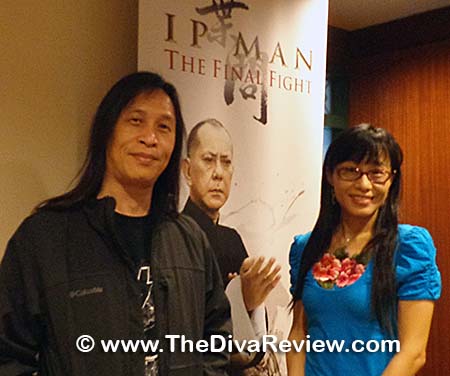 The
Lady Miz Diva: Ip Man: The Final Fight is very different in tone to
the first two Donnie Yen films which are much more action-driven. What
were the challenges in creating the prequel and ending chapter to his
life after those critically acclaimed movies and were you asked to keep
certain aspects of those films?
The
Lady Miz Diva: Ip Man: The Final Fight is very different in tone to
the first two Donnie Yen films which are much more action-driven. What
were the challenges in creating the prequel and ending chapter to his
life after those critically acclaimed movies and were you asked to keep
certain aspects of those films?
Herman Yau: Of course we had to add some action and fighting to the film. When we are talking about these kinds of movies, we always talking about heroes. So actually what is the definition of hero? It seemed like no one bothered to go into further studies into what a hero means. And this story I think, represents two points: One is that we wanted to portray a hero in our way. That means what we want a hero to be; more than a fighter, and he should possess more human qualities and he should have a kind of pride and self-esteem. The second point was that we wanted to contextualise that hero in that particular time and era in the past. How was he living during this time? We felt he would be more human with a realistic approach; even a hero has to eat and go to the toilet, all the very routine biological behaviour.
Erica Li: For me, I think in most martial arts movies they have the manís definition of a hero: He can fight and he treats he buddies very well, he saves his sifu and sihei. But for me, a hero is more than that; besides being able to fight, how does he treat his family? How does he treat his woman and the students and everything counts. We were trying to make a hero of all aspects. But actually, at the time, the real Ip Man, he was not a rich man with a high social status. During the 1950s and 60s, he was just a humble kung fu teacher. When I started to write, I thought destiny really is very mysterious; he has become so famous posthumously.
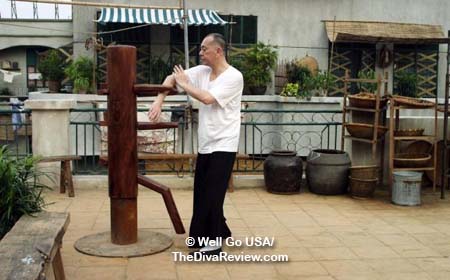 LMD:
In the West, most knew Ip Man primarily as the man who taught Bruce
Lee. Was there more known about him generally in Hong Kong than that?
LMD:
In the West, most knew Ip Man primarily as the man who taught Bruce
Lee. Was there more known about him generally in Hong Kong than that?
HY: Actually, heís not so popular or famous. Thatís why for the very first Ip Man movies, the investors looked on the down side. They really hesitated and Donnie Yen was not so popular. Donnie Yen achieved another apex of his career because of the first Ip Man. This implies that Ip Man was not the selling point before the first Ip Man.
EL: Actually, we should mention our investor, Mr. Checkley Sin, because he is an apprentice of Mr. Ip Chun {Ip Manís son}, so he has some dedication to tell the story of his masterís master - Ip Manís real life. I think he is one of the factors that made the Ip Man movies come true.
HY: On the other hand, the first two Ip Man movies by Wilson Yip, to a very far extent is it a portrait, but itís not based on real happenings. Our films are based on real happenings.
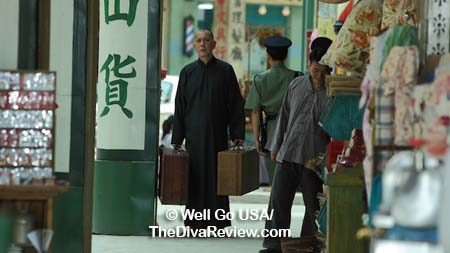 LMD:
In a way Ip Man is an avatar for the journey of Hong Kong and there is
so much going on in history at that time. How did you know what to
include to place the film historically and what to leave out to keep the
filmís momentum?
LMD:
In a way Ip Man is an avatar for the journey of Hong Kong and there is
so much going on in history at that time. How did you know what to
include to place the film historically and what to leave out to keep the
filmís momentum?
HY: Basically, I think ours is a character-driven movie. I hope that the audience is eager to see how this character undergoes all those happenings. And in terms of your saying Ip Man is an avatar for the course of history, I think thatís quite good because during his time, Ip Man was kind of an outsider of those happenings and sometimes it seemed that he got involved in those situations because of his relationships with the people around him. In that sense, we tried to be neutral, so that there was no bias, to let the audience takes sides if they thought there was something right or wrong.
EL: I know that there were a lot of happenings in the course of history and I wasnít born in the 1950s, but I remember what my mother told me about when she was a little girl. First things I thought of was my focus; my highlight would be the union strike. I also used the details about the water shortage.
HY: There was water only four hours a day. Life was very difficult.
EL: It brought back a lot of memories for the first and second generation Hong Kong people. Iím happy if Iíve made a time machine which has the same effect as Once Upon A Time in America, or the Italiansí version with Cinema Paradiso. You know you canít go back to that particular place and time, but through the script and the movie, you can travel through time.
HY: So in a way, this movie might not meet the expectations of some action movie fans, because actually itís kind of a drama with historical elements with a package of action.
EL: We strongly suggest they bring their girlfriends.
HY: So in a marketing sense, this movie is quite risky, but thatís whatís so exciting.
LMD: You featured Ip Manís son, Ip Chun in the cast. Did you look to him for any unknown details about his father to inform the script?
EL: For research, we had some reading material because a lot of people have written about Ip Man. Also, we talked to Ip Chun, which we did from the previous movie, Ip Man: The Legend is Born. For minor details, which was not written, like simple gestures like the way he smoked his cigarette and collected the ashes, and the way he sat with crossed his legs, which is very English gentleman. Director Yau said that usually the kung fu masters sat with open legs, but Ip Man sat with crossed legs like a lady. His accent was actually a Foshan dialect. At that era, Hong Kong was full of immigrants speaking all different kind of languages. Thatís why heís speaking Foshan and his girlfriend was a Shanghai lady.
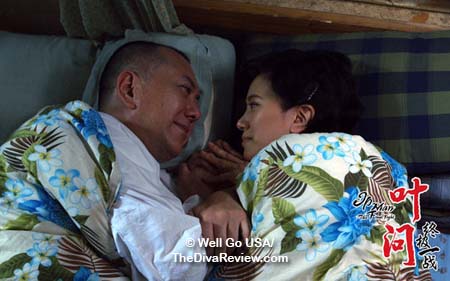 LMD:
So the girlfriend actually existed?
LMD:
So the girlfriend actually existed?
HY: Yes. Not 100%, but that relationship was based on real happenings.
EL: Also, the drug problem with the opium was real. She really existed. I have written something that everybody thinks; they donít want to die alone.
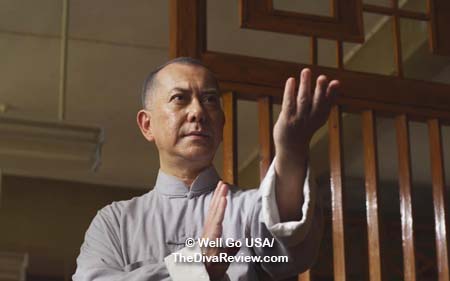 LMD:
When you have an actor as talented as Anthony Wong as your lead, do you
just let him go, or is he happy to take direction?
LMD:
When you have an actor as talented as Anthony Wong as your lead, do you
just let him go, or is he happy to take direction?
HY: First of all, the relationship between directors and actors is one based on mutual trust. The mutual trust between Anthony and I developed a long time ago. I made a movie when I was still a student, which he played a role in. As a director, you cannot let the actor go his way. Why? Because he will feel insecure; even the most egocentric actor, they want the director to give them some guideline. Of course they will say, ďNo, I donít think so.Ē I think they need some discussion like that. In that way, I trust Anthony very much. On the other hand, I also want him to do the character in my way, or in the chemistry created by me and him. So, the most important conversation, he asked me, ďHow do you think Ip Man should be?Ē Because he is a creative artist, he will try to portray the character in his way when given some guideline.
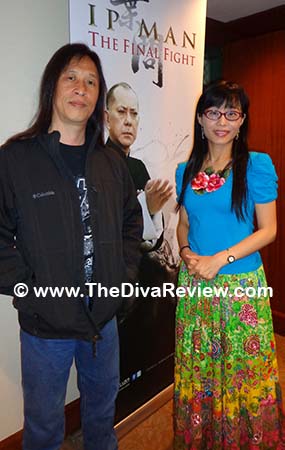 LMD:
Iíd like to ask what your thoughts are about the future of Hong Kong
films? Weíre in a stage where so much that we see is either historical
movies or very light films. Do you see a point when Hong Kong will go
back to the edgier, more realistic themes?
LMD:
Iíd like to ask what your thoughts are about the future of Hong Kong
films? Weíre in a stage where so much that we see is either historical
movies or very light films. Do you see a point when Hong Kong will go
back to the edgier, more realistic themes?
HY: Itís very difficult to pass the Mainlandís censorship. So, for a ghost story or a story about gangsters or the triads, censorship really matters. Of course I reject that kind of ridiculous censorship, but on the left hand, censorship always exists. Itís something we kind of have to tackle with. Even though thereís no office of censorship, I think thereís some discipline we have to abide to anyway, no matter if it originates from your moral judgment or anything related to these kind of issues. Under this case, we can always play tricks to get it through. Sometimes a restriction will give your work some character. So I donít see prohibition as something on the very negative side. For example, when Johnnie To made The Mission, it was the most difficult time of his career; so just because of his limited resources, he made a stylized Mission, otherwise the gun scene would be like A Better Tomorrow. Because of the lack of resources, he made it very stylish and then you donít have so many bullets and the gunfight scenes donít cost so very much. I still want to make films; I think I should see those restrictions as some kind of a challenge. At least as a challenge, it will result in a piece of work that has a kind of character.
EL: I think that what Director Yau said is usually done successfully by more established directors. When the directors are younger, they will stick to themselves and they donít know how to play the game. In Chinese, there is a saying when the ball falls on the white line in tennis and you could win, but it depends on whether the judge is in a good mood - but most of the young directors are like John McEnroes.
~ The Lady Miz Diva
July 1st, 2013
© 2006-2022 The Diva Review.com
|
|





















